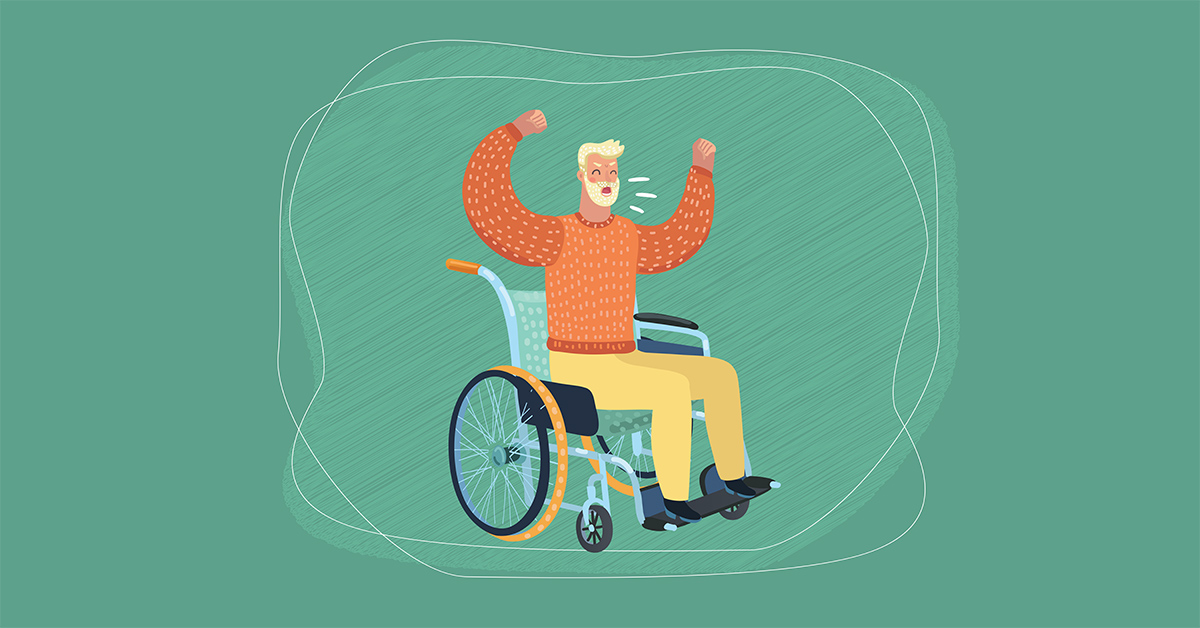
People who are experiencing cognitive decline may exhibit agitation at times, more so as the underlying disease advances. A person who is agitated may ignore someone who is speaking to them, grunt or have other verbal outbursts, refuse to eat, or resist regular tasks like bathing. Agitation can also present as anxious behaviors, such as pacing and fidgeting. There’s always the chance that a person is simply having an off day. But usually, something in the body, environment, or routine needs to be addressed.
When a new behavior is observed, first consider pain that the person may be unable to express, illness, or a side effect of a new medication. If a doctor has ruled out a medical reason for the behavior change, the caregiver should look at the person’s environment and routine. Agitation is usually related to an umet need. This could be itchy clothes, needing to use the bathroom, soiled undergarments, hunger/thirst, or being too hot/cold. Any alteration to routine can be problematic, such as irregular sleep, mistimed meals, too much noise/activity, or a change in who is providing care and how they do it (for example, changing the order of daily tasks or method of bathing assistance).
Sometimes, agitation is a result of mental health issues or psychotic conditions—either a diagnosed disease such as depression or schizophrenia, or general loneliness, boredom, and fear.
If the person’s needs remain unmet, frustration worsens and they may lash out at the caregiver. They may hit or spit. They may stiffen the body or tightly squeeze the caregiver’s hand or arm. They may throw food, utensils, or other objects at the meal table. It’s easy for a caregiver to take these actions personally. However, remember that these behaviors are almost always a patient’s desperate attempt to communicate in the only way they can.
When a caregiver observes unusual challenges in carrying out the daily routine, they should stop and think through some A-B-Cs:
A means Antecedent. This is what happens just before an upsetting incident.
B is the Behavior. This is the aggressive action that the patient does.
C refers to the Consequence. This is what happens after the behavior.
Here is a story about people we are calling Mary and Robert. In this story, Mary is the caregiver for her husband, Robert, who has Alzheimer’s disease.
A. The Antecedent. Mary overslept and now is in a hurry. She wants Robert to quickly get out of bed, eat, and get dressed before a driver arrives to take them to Robert’s doctor’s appointment. Mary yanks off the bed covers and yells at Robert to get up. He does not understand the words but reacts to her tone of voice. Mary gets angry when he pulls the bed covers back up. She yells at him and forcefully pulls him out of bed, then rushes through his dressing. Now he must balance on one leg rather than sit down to pull up his pants. This is not their usual routine when Mary takes her time helping Robert get ready.
B. The Behavior. Robert loses his balance because Mary is rushing him so much. He grabs her arm for support and does not let go. When she yells, he grabs even tighter. Robert is now digging his nails into Mary’s arm.
C. The Consequence. Mary loses control and smacks Robert in the face (something she had never done before). He hits her back. Mary thinks he is fighting, though it may be that he is just afraid and doing to her what she did to him. Mary now worries that Robert will hurt her again. She questions whether she can care for him at home.
Let’s re-evaluate this story with the ABC Method in mind.
Mary will make a list of what happened just before Robert’s upsetting behavior. She will look for causes of what went wrong.
Mary can see that the problems started when she rushed and did not think of how Robert would react. Mary learned that because Robert has Alzheimer’s disease, he cannot be rushed. While she should not feel guilty, she should realize how her actions made this worse.
If Mary is ever late again, she will call the doctor’s office and ask if they can come later in the day or make a new appointment.
Sources: Alzheimer’s Association, Teepa Snow, National Institutes of Health, Comfort of Home for Alzheimer’s Disease (CareTrust Publications, 2007)